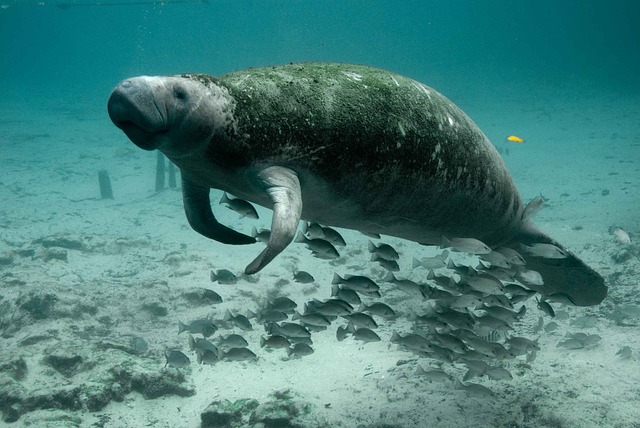
Swimming slowly at the surface while leisurely munching on seagrass, manatees are the gentle giants of the water. They are marine mammals, so they spend their lives in coastal waters, estuaries and rivers but have to come up to the surface to breathe, like whales and dolphins!
The biggest threats to manatees
Manatees have few natural predators. Humans are by far their biggest threat, directly through poaching and indirectly through changes to their environment. We need to act now to help save these majestic creatures that, according to the IUCN Red List of Endangered Species lists, are venerable and decreasing in number.
1. Hunting
Manatees are gentle giants that spend time munching sea grass slowly close to the water’s surface. That makes them an easy target for hunters that want them for their hide, oil and bones. This was more of an issue in the past as manatees are now a protected species, but populations are still recovering from intense hunting today, and illegal poaching still occurs, particularly in Africa and South America.
2. Fishing
Like most marine animals, manatees are at threat from fishing gear. Getting tangled in nets can cause injuries and may result in death. The same can be said for other marine litter, which can cause injuries or be eaten by mistake.
3. Increasing boat traffic
Manatees live in coastal waters, estuaries and rivers. Boat traffic in these areas is increasing, and because manatees feed on sea grasses, they spend a lot of time close to the surface. This puts them at risk of boat strikes, and it is one of the biggest killers of manatees today.
4. Habitat loss
Coastal development is on the increase worldwide. And unfortunately, this is often at the expense of vital marine habitats, such as the seagrass beds that manatees rely on.
As well as physical removal, though, development and agriculture affect water quality and indirectly kill seagrass, leaving less food for manatees. Dams prevent manatees from moving around their habitats, so they can isolate populations and interfere with water flow, quality, and nutrient levels. This can increase the likelihood and severity of harmful algal blooms. When these occur, manatees can suffer from poisoning after consuming seagrass full of toxins.
5. Climate change
Manatees are sensitive to environmental changes, so they are at risk from climate change. One of the main risks is related to their food. Seagrass need sunlight to grow, they rely on clear waters. Rising sea levels, the increase in turbidity, and lower water quality all threaten seagrass. And, less seagrass means less food and a major shift in manatee habitat.
More extreme and more frequent weather events, such as storms, will also have huge impacts on the environment, including seagrass beds. Fertilisers and pesticides from the land are washed into the waterways, where they cause a decline in water quality and increase the likelihood of harmful algal blooms.
Manatees are also susceptible to changes in temperature. And they may suffer health issues if the water temperature decreases for a prolonged time. Changes in temperature have been linked to deaths, too.
Manatee Appreciation Day

March 29th is Manatee Appreciation Day! Started over 40 years ago in 1981 by the Save the Manatee Club, it is a day to celebrate manatees and how awesome they are!
By spreading the facts and talking about their threats to survival, we can raise awareness of their plight and promote their conservation. Here are some other ways we can help:
- Look after the environment. Manatees are susceptible to climate change. Making small changes to how you live will make a difference to the planet and all its fantastic creatures – read our top 10 tips.
- Always throw away your rubbish and carry out litter picks to avoid litter finding its way into the environment.
- If you live in a manatee area, become part of the Manatee Sighting Network and help researchers with their conservation efforts.
- Donate or raise money for a charity working to protect manatees and their vital habitats.
- Be a responsible tourist. Seeing manatees in the wild is an amazing experience, but wildlife tourism can do more harm than good. If you decide to go looking for wildlife, do your research first, and find a responsible company that puts wildlife manatees first.